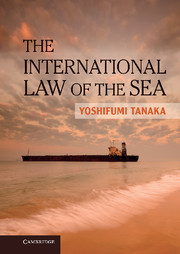Book contents
- Frontmatter
- Contents
- Preface
- Acknowledgements
- Figures
- Tables
- Abbreviations
- Table of Cases
- Table of Treaties and Instruments
- Part I The Divided Oceans: International Law Governing Jurisdictional Zones
- 1 The Law of the Sea in Perspective
- 2 Baselines and Related Issues
- 3 Marine Spaces under National Jurisdiction I: Territorial Sovereignty
- 4 Marine Spaces under National Jurisdiction II: Sovereign Rights
- 5 Marine Spaces beyond National Jurisdiction
- 6 Maritime Delimitation
- Part II Our Common Ocean: Protection of Community Interests at Sea
- Index
- References
4 - Marine Spaces under National Jurisdiction II: Sovereign Rights
Main Issues
from Part I - The Divided Oceans: International Law Governing Jurisdictional Zones
- Frontmatter
- Contents
- Preface
- Acknowledgements
- Figures
- Tables
- Abbreviations
- Table of Cases
- Table of Treaties and Instruments
- Part I The Divided Oceans: International Law Governing Jurisdictional Zones
- 1 The Law of the Sea in Perspective
- 2 Baselines and Related Issues
- 3 Marine Spaces under National Jurisdiction I: Territorial Sovereignty
- 4 Marine Spaces under National Jurisdiction II: Sovereign Rights
- 5 Marine Spaces beyond National Jurisdiction
- 6 Maritime Delimitation
- Part II Our Common Ocean: Protection of Community Interests at Sea
- Index
- References
Summary
This chapter will examine rules governing the contiguous zone, the EEZ and the continental shelf. In the contiguous zone, the coastal State may exercise the control necessary to prevent and punish infringement of its customs, fiscal, immigration or sanitary laws and regulations within its territory or territorial sea. Whilst the LOSC contains only succinct provisions respecting the contiguous zone, the legal nature of the coastal State jurisdiction over the zone deserves serious consideration. The raison d’être of the institution of the EEZ and the continental shelf involves the conservation and management of natural resources. In this sense, the EEZ and the continental shelf can be considered as a ‘resource-oriented zone’. Owing to the increasing importance of marine natural resources, these zones are particularly important for coastal States. Presently the extension of the continental shelf to a limit of 200 nautical miles attracts particular attention. This chapter will discuss the following issues in particular:
What is the coastal State jurisdiction over the contiguous zone?
What is the coastal State jurisdiction over the EEZ and the continental shelf?
What is the difference between territorial sovereignty and sovereign rights?
What are the freedoms that all States can enjoy in the EEZ?
What residual rights are there in the EEZ?
What are the criteria for determining the outer limits of the continental shelf?
Introduction
The legal regimes governing the EEZ and the continental shelf are essentially a result of the aspiration of coastal States for their need to control offshore natural resources. As will be seen, the coastal State exercises sovereign rights over the EEZ and the continental shelf for the purpose of exploring and exploiting natural resources. Other States cannot explore and exploit these resources in the EEZ and the continental shelf without the consent of the coastal State. On the other hand, as the EEZ and the continental shelf are part of the ocean as a single unit, legitimate activities in these zones by third States, such as freedom of navigation, overflight and the laying of submarine cables and pipelines, must be secured.
- Type
- Chapter
- Information
- The International Law of the Sea , pp. 120 - 148Publisher: Cambridge University PressPrint publication year: 2012



